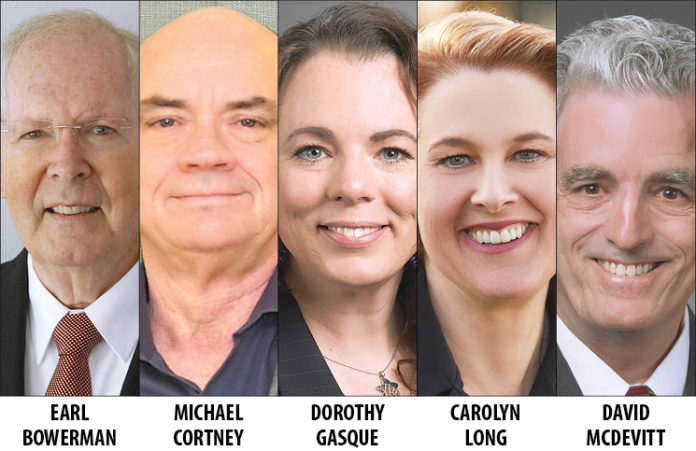Five of the seven candidates running for the position of representative for Washington’s 3rd Congressional District participated in a candidate forum the evening of July 12. The forum was put on by the Clark County League of Women Voters and was held at Clark College’s Gaiser Hall.
Incumbent Jaime Herrera Beutler did not attend the forum, and neither did candidate Martin Hash. According to a statement from Angeline Riesterer, communications director for Herrera Beutler, “This forum was scheduled when Congress was in session so Rep. Herrera Beutler was in DC voting and couldn’t attend.”
Candidates in attendance included David McDevitt, Michael Cortney, Carolyn Long, Earl Bowerman and Dorothy Gasque. McDevitt, Long and Gasque all filed as Democrats; Cortney and Bowerman filed as Republicans.
During the forum, the candidates were asked a variety of questions on numerous topics, ranging from infrastructure funding to income disparity to freedom of the press. Here are a few of the questions that were asked and the highlights of the candidates’ answers. The forum in its entirety can be viewed at www.cvtv.org.
Question: Income disparities are increasing. What tangible actions have you taken, or would you take if elected, to address economic justice issues and/or to create family-wage jobs?
McDevitt: “I would fight to increase the minimum wage to $15 at a minimum knowing that it would likely have to be something higher than that as we’re moving forward. We also need to take care of the social security benefits.”
Cortney: “The greatest asset we have that creates wealth is labor and I believe that labor is entitled to a fair share of what they create, and that’s not what’s happening. If we want to fix the income inequalities with this country, it starts with being able to gather as people and say, ‘we want a fair wage.’”
Long: “I think we have to have massive investments in infrastructure projects, because infrastructure projects create those family wage jobs, hopefully union family wage jobs. Then we have to invest heavily in education for those who want to learn more so they can get jobs in this rapidly evolving economy, but also provide other pathways for success.”
Bowerman: “We’ve heard here that we should have a $15 minimum wage. Why not have a $30 minimum wage, or a $50 minimum wage? I mean, if we’re going to do that, let’s do it so it’s meaningful.”
Gasque: “We can do this by raising the minimum wage to a living wage, and I don’t think it’s $15 an hour, I think by the time we implement a full wage it will be well over $15. We need to do more. We need to do more as a community. Our leaders need to do more.”
Question: How should the federal government fund infrastructure repair?
McDevitt: “ I’ve spent a lot of time learning about it (roads and bridges), and one of the things we need to do first, before anything else, is having equal seats in terms of a relationship between Oregon and Washington states. Then we can start having real solutions and figure out where the money comes from.”
Cortney: “We need to tax that 1 percent more, we need to use that money to help build a future for our children.”
Long: “You’re not going to find the money cutting our earned benefits programs like social security. You’re not going to find it in the programs that help our most vulnerable. So, you should look at the places where there actually is a little fat in the budget. I would start with the Defense Department budget.”
Bowerman: “I think it’s the federal government’s responsibility to provide internet access. I think the federal government has a responsibility to build a west corridor for Interstate 5 around Portland, and I think it should be very much like 205 and I think the infrastructure should not include tolls. I am totally against these tolls that Oregon is trying to have imposed on the 72,000 or so Washingtonians who use that to travel across the river every day to work.”
Gasque: “The longer we wait to fix it, the more expensive it gets to fix, so shouldn’t really be too concerned about financing it, but if we really are going to be concerned about financing it, how about we stop blowing up infrastructure all over the world and rebuilding it? Our wars in Afghanistan and Iraq have cost us about $5 trillion. The cost to upgrade and fix our infrastructure – $4.6 trillion. That’s how we finance it.”









